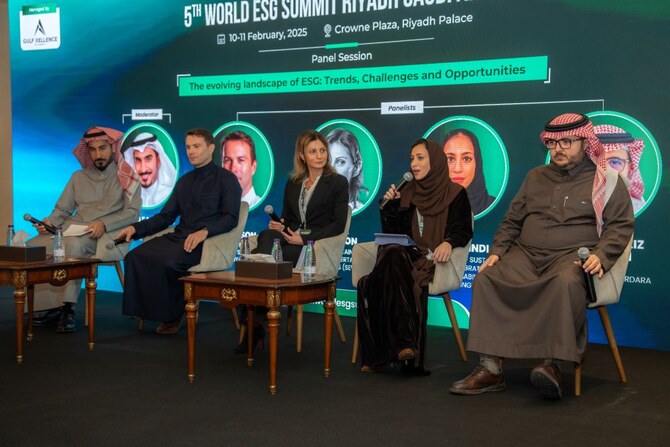RIYADH: Saudi Arabia is developing unified national environmental, social, and governance guidelines that aim to bring reporting up to international standards, an official said.
“By developing a robust ESG ecosystem, we can address current challenges while preparing for a more sustainable future,” Yara Sindi, general manager of monitoring, reporting, and policies for sustainability, and director of corporate sustainability at the Ministry of Economy and Planning said during a conference in Riyadh.
“With 30 percent of our top companies already reporting on sustainability and growing awareness globally, we have an incredible opportunity to capitalize on this momentum,” Sindi said.
Despite this progress, Sindi noted that the quality of these reports remains a challenge. Many are not aligned with international standards, resulting in weak ratings and limited investor engagement, she said.
While there are multiple existing national guidelines that have been developed by different jurisdictions, Sindi pointed out that there is still no unified approach.
She emphasized the need for Saudi companies to improve the accuracy and transparency of their sustainability reports.
“It’s essential to equip our corporates with the tools and frameworks they need to produce high-quality reports,” she said.
Sindi added that this will allow them to better translate their efforts into measurable outcomes that investors can trust.
To tackle these challenges, Saudi Arabia is developing its own national sustainability reporting standards.
“These guidelines, informed by international best practices, aim to provide a unified approach that simplifies reporting for companies while ensuring alignment with global expectations,” she added.
Sindi made the comments during a panel discussion titled “The Evolving Landscape of ESG: Trends, Challenges, and Opportunities” at the fifth World Environmental Social and Governance Summit in Riyadh this week.
She said that investors’ awareness of national ESG initiatives is not where it should be, due to the disconnect between companies and investors regarding sustainability efforts.
“We are working to bridge this gap by fostering conversations and knowledge-sharing between corporates and investors.”
Abdulaziz Al-Ghamdi, director of sustainability at Ardara, also participated in the discussion, emphasizing a critical aspect of proper ESG implementation.
“A lot is going on — the landscape on the policy and the implementation of the strategy — and there’s lots of effort and work to be thanked for.”
Al-Ghamdi added that where most companies fail to address proper ESG implementation strategy, and the way that it can aid decision-making, is in identifying, primarily, many different materiality topics and the sustainability mandate.
“That being said, ESG is a metric for those who have not been involved in it — to calculate, to measure, to track, and to assess the performance of a company towards this broader stakeholder engagement,” he explained.
Al-Ghamdi said that there is a lot of work that has been completed to do that, but there are significant challenges in implementing these kinds of ESG strategies.
Neil Atkinson, senior vice president and head of ESG and sustainability at Riyadh Bank, added further insights into how ESG opens new opportunities for Saudi Arabia’s rapidly transforming sectors such as construction, energy, and real estate.
“I’d say, with the mass transformation we have here in Saudi Arabia for all sectors, how ESG in collaboration with this transformation can provide new opportunities for us here in the Kingdom,” Atkinson said.
He identified four key trends shaping the ESG landscape from a banking perspective.
“The first one is the increasing growth of green, social, sustainability, and sustainability-linked instruments,” Atkinson said.
He noted that in the US, self-identified assets under management in ESG reached $6.5 trillion in 2024, reflecting a significant year-on-year rise.
Atkinson pointed to the scaling of clean energy technologies, particularly solar, hydrogen, and wind, as a second major trend.
The third trend Atkinson highlighted was the increasing demand from investors for measurable ESG metrics.
“There are innumerable macro studies that demonstrate the strong positive correlation between sustainability performance and financial performance,” he said.
This drives investor interest in companies’ ESG integration into corporate planning and strategy. Atkinson linked this trend to regulatory developments.
He added: “Sustainability performance equals financial performance, which equals financial stability. And that’s a trend we see continuing.”
Atkinson said that there are 3,000 Saudi companies impacted by the Corporate Sustainability Reporting Directive requirements.
“This will influence how businesses set up their exports and how we in the financial sector help companies transition to meet these requirements.”


























